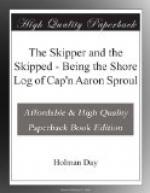“If that’s the case,” called the committeeman, heart-brokenly, “won’t you put your name down for a little?”
“Since I’ve had the rheumatiz I ain’t been any hand at all to dance,” remarked the Cap’n, gently, through the crack of the closing door.
And they knew what he meant, and went away down the hill, as sober as the cricket when he was departing from the door of the thrifty ant.
XXXIII
First Selectman Sproul halted for a few moments on the steps of the town house the next morning in order to gaze out surlily on the left-overs of that day of celebration. Smyrna’s village square was unsightly with a litter of evil-smelling firecracker remnants, with torn paper bags, broken canes, dented tin horns and all the usual flotsam marking the wake of a carnival crowd.
Constable Nute came tramping to him across this untidy carpeting and directed his attention to the broken windows in the town house and in other buildings that surrounded the square.
“Actions of visitin’ firemen, mostly,” explained the constable, gloomily. “Took that way of expressin’ their opinion of a town that would cheat ’em out of prize-money that they came down here all in good faith to get. And I don’t blame ’em to any great extent.”
“Nor I, either,” agreed the Cap’n with a readiness that surprised Mr. Nute. “A town that doesn’t pay its bills ought to be ashamed of itself.”
The constable backed away a few steps and stared at this amazing detractor.
“I paid bills prompt and honest just as long as there was any money to pay ’em with,” the Cap’n went on. “There’s nothin’ on my conscience.”
“Yes, but who did you pay the money to?” complained Nute, voicing the protest of Smyrna. “The least you could have done was to make them plug-hatters share pro raty with the fire-company boys—and the fire-company boys furnished the show; them plug-hatters didn’t.”
“It’s always been my rule to pay a hundred cents on the dollar, and I paid the hundred cents so long as the cash lasted. Go hunt up your Pote Tate if you want to know why the plug-hatters had a good claim.”
“He’s back, Tate is, and we made him explain, and this town had no business in givin’ a cussed fool like him so much power. If I had cut up the caper he has I’d have stayed away, but he’s back for his folks to support him some more. He didn’t even have gumption enough to beg vittles.”
“Well, this town has had a hearty meal, and all is I hope it won’t feel hungry for celebrations till it’s time for the next centennial,” observed the Cap’n. “There’s one thing about this affair that I’m goin’ to praise—it was hearty and satisfyin’. It has dulled the celebratin’ appetite in this town for some time.” He went into town office.
The constable followed and laid a paper before him. It was a petition of citizens for a special town-meeting; and there being a sufficient number of names on the paper, it became a matter of duty for Cap’n Sproul to call the meeting prayed for.




